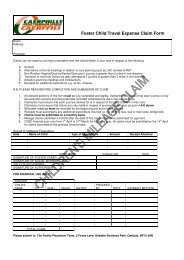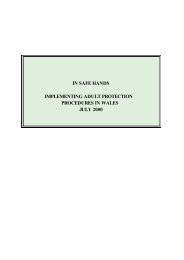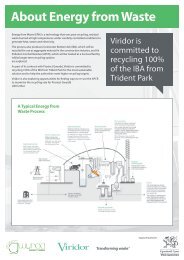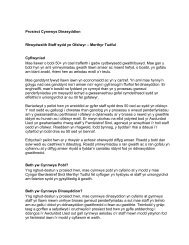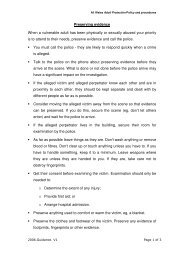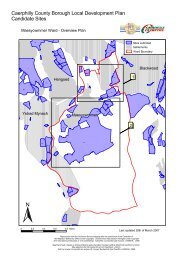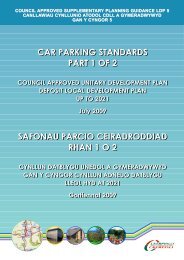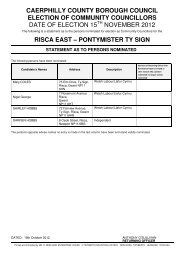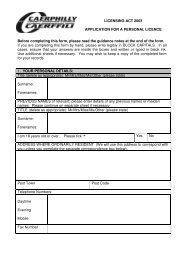Garden bonfires - Worthing Borough Council
Garden bonfires - Worthing Borough Council
Garden bonfires - Worthing Borough Council
Create successful ePaper yourself
Turn your PDF publications into a flip-book with our unique Google optimized e-Paper software.
GARDENBONFIRESworking for a cleaner, quieter, healthier world
The bonfire takes its name from the medieval bon-fire of animalbones. While modern day bonfire ingredients are on the wholeless gruesome, burning waste materials can cause pollution andlocal nuisance. Fires have been used throughout the centuries –to mark occasions, as signals and to dispose of waste. However,we now have alternatives for disposing of most materials – andburning some things is illegal.What's Wrong with Bonfires?● Air PollutionBurning garden waste produces smoke – especially if that wasteis green or damp. This will emit harmful pollutants includingparticles and dioxins. Burning plastic, rubber or painted materialscreates noxious fumes that give off a range of poisonouscompounds.● Health EffectsAir pollution can have damaging health effects, and people withexisting health problems are especially vulnerable, e.g.asthmatics, bronchitis sufferers, people with heart conditions,children and the elderly.● AnnoyanceSmoke, smuts and smell from <strong>bonfires</strong> have long been a source ofa significant number of complaints to local authorities every year.Smoke prevents neighbours from enjoying their gardens, openingwindows or hanging washing out, and reduces visibility in theneighbourhood and on roads. Allotments near homes can causeproblems if plot holders persistently burn green waste, and leavefires smouldering.● SafetyFire can spread to fences or buildings and scorch trees and plants.Exploding bottles and cans are a hazard when rubbish is burned.Piles of garden waste are often used as a refuge by animals, solook out for hibernating wildlife and sleeping pets.What's the Alternative?● CompostingRather than burning garden waste or putting food waste in thedustbin where it will end up buried or incinerated, a compost binwill produce useful soil conditioner, saving money on commercialproducts. Some local authorities collect this waste. Woody wastecan be shredded to make it suitable for composting or mulching.You can buy or hire shredders, and some allotment societies havetheir own. If using a shredder be considerate – they are very noisyso don’t swap one nuisance for another
Advice on composting is available from your local authority andfrom gardening organisations. The following provide informationleaflets on composting, for which there may be a small charge:Centre for Alternative TechnologyMachynllethPowys SY20 9AZTel: 01654 705989www.cat.org.ukInformation Department<strong>Garden</strong> OrganicRyton <strong>Garden</strong>sCoventryWarwickshire CV8 3LGEmail: enquiry@gardenorganic.org.ukTel: 024 7630 3517www.gardenorganic.org.uk● RecyclingHousehold waste should certainly not be burnt. Many itemscan be reused or recycled and your local council will haverecycling facilities. Some local authorities provide bins for youto separate your waste and collect garden waste, others maycharge for a service or you can take it to the local amenity site.Burning old furniture can cause particular hazards, as somematerials can release toxic fumes when burnt. If furniture is inreasonable condition there are many charitable or councilservices that collect and re-use unwanted items; many localauthorities also offer a bulky waste collection service for oldfurniture. Your unwanted goods may also be of value to otherpeople and can be donated to charity shops, or even make youmoney through sale in classified adverts, car boot sales orservices such as eBay.Bonfires and the Law● When and where can I have a bonfire?It is a common misconception that there are specific byelawsprohibiting garden <strong>bonfires</strong> or specifying times they can be lit –there aren’t. However, this is not a licence for indiscriminateburning! Occasionally a bonfire is the best practicable way to
dispose of woody or diseased waste that cannot be composted.And <strong>bonfires</strong> are used to mark traditional celebrations – especiallyNovember 5th.Under the Environmental Protection Act 1990 (as amended) it isan offence for people to dispose of their domestic waste in a waylikely to cause pollution of the environment or harm to humanhealth. In practice you should not burn waste that is likely to createexcessive smoke or noxious fumes. If only dry garden waste isburnt, your bonfire should not cause a problem.Most bonfire problems are addressed under nuisance legislation.Under the Environmental Protection Act 1990, a statutorynuisance includes “smoke, fumes or gases emitted from premisesso as to be prejudicial to health or a nuisance.” In practice a firewould have to be a recurrent persistent problem, interferingsubstantially with neighbours’ well-being, comfort or enjoyment oftheir property. (In N Ireland the Public Health Act 1878 definesnuisance, however the proposed Clean Neighbourhoods andEnvironment Bill includes nuisance controls similar to those in therest of the UK.)If a bonfire of industrial or commercial waste is emitting blacksmoke it is dealt with under the Clean Air Act 1993 – this includesthe burning of such material in your garden! Under section 34 ofthe Environmental Protection Act 1990 it is illegal to dispose ofwaste that is not from your property – for example from yourworkplace or from a neighbour. For example, small tradesmenmust not burn waste from site at home.● How do I complain about a bonfire?If bothered by smoke, approach your neighbour and explain theproblem. You might feel awkward but they may not be aware of thedistress they are causing and it will hopefully make them moreconsiderate in the future. If this fails, environmental health at yourlocal council should be notified. They must investigate yourcomplaint and must issue a notice under the EnvironmentalProtection Act 1990 if they consider a nuisance is being caused.The Act also allows you to take private action in the magistratescourt. However, if a fire is a one-off it may be difficult to prove anuisance. Similarly, if you are troubled from <strong>bonfires</strong> from differentneighbours, each only burning occasionally, a nuisance actionwould be difficult as there are several offenders. In this situationencourage them to consider the alternatives – give them a copy ofthis leaflet! Finally, under section 161A of the Highways Act 1980,anyone lighting a fire and allowing smoke to drift across a roadfaces a fine if it endangers traffic or causes injury. Contact thepolice if this is the case.
BarbequesBarbeques can also cause smoke and odour problems –especially if you use lighter fuel. Again, be considerate. Warn yourneighbours, and don’t light up if they have washing out. If it iswindy make sure smoke won’t blow directly into neighbouringproperties – and keep the noise down.But I Like Bonfires…..A bonfire can be a useful way for disposing of garden waste thatcannot be composted – or perhaps you want a bonfire just for fun.Bonfires have traditionally been used to mark events – currentlythe main bonfire tradition is Bonfire Night, and in N Ireland 11thJuly. If you do have a bonfire to dispose of garden waste, or onBonfire Night, warn your neighbours – they are much less likely tocomplain. And follow our good bonfire guidelines.Bonfire Guidelines:● Only burn dry material● Never burn household rubbish, rubber tyres or anythingcontaining plastic, foam or paint● Avoid lighting a fire in unsuitable weather conditions –smoke hangs in the air on damp, still days. If it is too windy,smoke blows into neighbours’ gardens and windows andacross roads● Avoid burning when air pollution levels in your area are highor very high. You can check air quality on 0800 556677 orat www.airquality.co.uk● Keep your fire away from trees, fences and buildings● Never use oil, petrol or methylated spirits to light a fire –you could damage yourself as well as the environment● Never leave a fire unattended or leave it to smoulder –put it out
working for a cleaner, quieter, healthier worldYou may also be interested in our leaflets on:● Air Pollution● Domestic Smoke● Fireworks● Light Pollution● Neighbour NoiseEnvironmental Protection UK44 Grand ParadeBrightonBN2 9QAEmail: admin@environmental-protection.org.ukTel: 01273 878770www.environmental-protection.org.ukCharity Registered in England and Wales number 221026Charity Registered in Scotland number SC040990© Environmental Protection UK, May 2010



